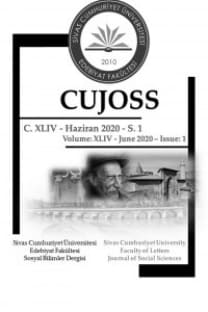Montaigne ve Montesquieu'de İnsan, Erdem ve Trogloditler
Montaigne ve Montesquieu insan ve toplum değerlerini evrensel boyutta irdeleyen, toplum düzeninde, idarede ve insani ilişkilerde erdemi ve adalet duygularını ön plana çıkaran iki büyük Fransız düşünürü ve yazarıdır. Bir insanın iyi insan olması kendini tanımasıyla başlar. Eski çağlardan beri "kendini tanımak" bilgeliğin ve bilginliğin temeli sayılmıştır. Yunanistan'daki Delphes tapınağının cephesinde "Kendini Tanı" yazılıdır. Eflatun'un insana öğüdü ise "kendi işini yap ve kendini tanı"dır. Montaigne de Denemeler'inde kendini insanların bir örneği olarak ele alır, kendini gözlemler, inceler ve tanımaya çalışır, çünkü "her insanda insanlığın tüm halleri vardır" der. Montesquieu kendini önce insan, sonra Fransız olarak betimler. Sokrat'a nerelisin? diye sorulduğunda, Atinalıyım demez, dünyalıyım, derdi. Şu halde insan her zaman hümanist bir duygu içinde olacak, yaşayacak ve erdemli olacaktır. Erdem sözcüğünün Latincesi "virtù"dür ve anlamı "cesaret" demektir. Erdemli bir kişi her yerde, her ortamda doğruyu söyleyecek, dürüst ve adil olacak, doğrunun, güzelin, iyinin yanında yer alacak, kötünün, haksızın ve zorbalığın karşısında olacaktır. Trogloditler Montesquieu'nün İran Mektupları'nda (11-14 mektup) ele aldığı ve Libya'da yaşadığı öne sürülen ilkel bir kavimdir. Bu ilkel kavim erdem sayesinde barışa, huzura ve düzgün bir yönetime, yani Cumhuriyet'e kavuşacaktır. Çünkü demokratik cumhuriyetin temel direği erdemdir.
Man, Virtue and Troglodytes in Montaigne and Montesquieu
Montaigne and Montesquieu are two great French philosophers and writers who dig man and the society in an international level, and they focus on the virtue, justice between human relations, government and the social order. To be a good man begins with knowing yourself. Since the Ancient times "knowing yourself" is considered as the source of maturity and science. At the front site of the Delphes oracle in Greece it is written that: "Know yourself". Plato's word is: "Do your own business and know yourself". Montaigne also in his, Essays takes himself as an example of mankind and investigates and tries to know, for "every human being has all the moods of humanity", he says, Montesquieu first considers himself as a human, and then a French. When it is asked to Socrates as: "Where are you from?", he says he is from the world not Athens. So man will always be a humanist, will live and have virtue. The Latin version of virtue is: "virtù" and it means "courage". A virtuous person will say the truth in everywhere will be right, having justice and will be supporting the right and the good, and he will be against injustice and force. Troglodits is a primitive society that Montesquieu mentions in his Iran Letters (11-14 letters) in Lebanon. This primitive society will reach peace, goodness and a proper government, that is to say the Republic, since the source of a democratic republic is virtue.
___
- ALPER, A. (1993), "Montaigne Éducateur, Initiateur De John Locke", Frankofoni, Ankara: Ortak Kitap sayı 5.
- AULOTTE, R.( 1994) , Montaigne: Essais, Paris: Edition P.U.F.
- BECQ, A.( 1999), Lettres Persanes de Montesquieu, Saint-Amand : Edition Gallimard.
- BENET, R. (1999), Montesquieu, Lettres Persanes, (Ligugé) Poitiers : Edition Résonances ellipses.
- BOUDOU, B. (1995), Essais, Montaigne, Evreux : Edition Hatier.
- CHARPENTIER, M., CHARPENTIER, J.(1993), Lettres Persanes, Paris : Edition Nathan.
- DELON, M.(1977), l'article intitulé "un monde d'eunuques" dans la revue littéraire mensuelle Europe qui porte le titre Montesquieu, no: 574, Paris, février.
- LAUNAY, M., MAILHOS, G.(1996), Introduction à la vie littéraire du XVIIIe siècle, Saint-Etienne : Dunod.
- LESOT, A.(1995), L'autobiographie (De Montaigne à Nathalie Sarraute) Evreux : Edition Hatier.
- MOLIERE. (1970), Le Bourgeois Gentilhomme, Evreux : Librairie Larousse.
- MONTAIGNE, M. De. (1968), Essais (3 Vol.), Paris : Editions Gallimard et librairie Générale Française
- MONTAIGNE, M. De. (1985), Essais (Extraits analysés et préparés par Claude Faisant), Nancy : Ed. Bordas.
- MONTESQUIEU, C. De S. Baron De.(1985), Lettres Persanes, Saint-Amand : Ed. Gallimard.
- PARAF., P.(1977), l'article intitulé "Montesquieu, La Tolérance et la liberté" dans la revue littéraire mensuelle Europe qui porte le titre Montesquieu, no: 574, Paris février.
- SABBAH, H.(1996), La critique de la société au XVIIIe siècle, Ligugé (poitiers) : Ed. Hatier.
- SOREL, A.(1975), Montesquieu, Paris : Librairie Hachette.
- TÜTENGİL, Cavit Orhan. (1977) , Montesquieu, İstanbul: Cem Yayınevi.
- VARDAR, B. (Tarihsiz), Aydınlanma Çağı, Fransız Yazını Ankara: Kuzey Yayınları.
- VARDAR, B.(1998), Fransız Edebiyatı, İstanbul: Mültilingual.
- VEQUAUD, A.(1993), Lettres Persanes de Montesquieu, Saint-Amand : Ed. Gallimard.
- VERSINI, L.(1988), Le XVIIIe siècle, Littérature française, Nancy : Presses Universitaires De Nancy.
- ISSN: 1305-5143
- Yayın Aralığı: Yılda 2 Sayı
- Yayıncı: Sivas Cumhuriyet Üniversitesi Edebiyat Fakültesi
Sayıdaki Diğer Makaleler
Toplumsal Değişim ve Eğitim Üzerine
Toplumun Tabakalı ve Olasılıklı Yapısı
Demokratik Meşruiyet Versus Karizmatik Meşruiyet
Montaigne ve Montesquieu'de İnsan, Erdem ve Trogloditler
Ulaşım Hizmetlerinde Hizmet Kalitesi ve Bir Uygulama
İlköğretim Altıncı Sınıf Öğrencilerinin Matematik Dersinde Karşılaştıkları Sorunlar
Merton's Starin Theory: Evidence from the High Schools in Ankara
